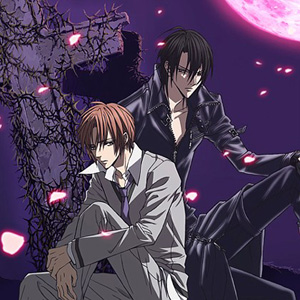 I’m sure it will come as no surprise to learn that Uragiri wa Boku no Namae wo Shitteiru is commonly referred to by fans as UraBoku. In spite of some major flaws, it’s one of the most engaging anime series I’ve run across recently.
I’m sure it will come as no surprise to learn that Uragiri wa Boku no Namae wo Shitteiru is commonly referred to by fans as UraBoku. In spite of some major flaws, it’s one of the most engaging anime series I’ve run across recently.
Sakurai Yuki (Japanese name order) is an orphan. He was discovered as a newborn in the bushes outside the orphanage where he now lives. Yuki has always been a strangely talented boy, able to feel others’ emotions — and able to make them feel better. His friend Wakamiya Kanata is helping him look for a place to live — Yuki’s about to graduate from high-school and will need to leave the orphanage. And then an older man appears, Giou Takashiro by name, claiming to be Yuki’s older brother. And now Yuki has to make a decision — go with Takashiro and begin a new life as a member of a powerful clan, or to stay at the orphanage with the children (who adore him) and continue his friendship with Kanata-san. And then weird things start to happen — like the evening Yuki rushes out to meet his friend Uzuki and is almost killed by a runaway truck — with no driver — and saved at the last minute by a very beautiful and somewhat taciturn stranger. Yuki finds himself fascinated by the man, who gives his name as Zess. However, these sorts of incidents keep happening, and Yuki, after being saved by Toko and Tsukumo, two other members of the Gioui clan, realizes he has no choice but to join them.
If this sounds like a complicated set-up, that’s because it’s a fairly complex story. There are layers of story here, marked by hidden identities, deception from all quarters — and, of course, Yuki’s lost memories.
Let’s start with the last: it turns out that Yuki and Luka (which is Zess’ real name) were lovers in Yuki’s past life, when Yuki was a woman. In this life, Yuki has chosen to be reborn as a man — at least, that’s Luka’s perception. And no one from the Giou clan is coming clean on this issue. (I’m not giving anything away here — this relationship was drawn in the opening scene of episode 1.)
Nor on anything else: it seems that Yuki’s gifts are central to the clan’s purpose, which is to defeat an immensely powerful necromancer, Reiga — a renegade member of the clan. It is Reiga’s minions, demons of various degrees of power (called “Duras” in the anime), who are responsible for the attacks on Yuki, on Reiga’s orders. (Oh, and Reiga has also had an assumed identity that is enough to set Yuki back on his heels when he learns of it.)
The execution is, while not quite flawless, close enough to be satisfying. The style is what I’ve come to call “high shoujo” (shoujo is the term for “manga for girls”): figures are slender and somewhat elongated, and everyone — even the Duras — is beautiful. Settings are evocative and add to the mood.
My one complaint is that Yuki is something of a dishrag — I found myself thinking “Yuki — for Pete’s sake, get a grip!” But that’s the character.
Fun fact: My DVD was purchased from a dealer in Malaysia, and has subtitles in English, Chinese, and Malay.
For full data see Anime News Network.
